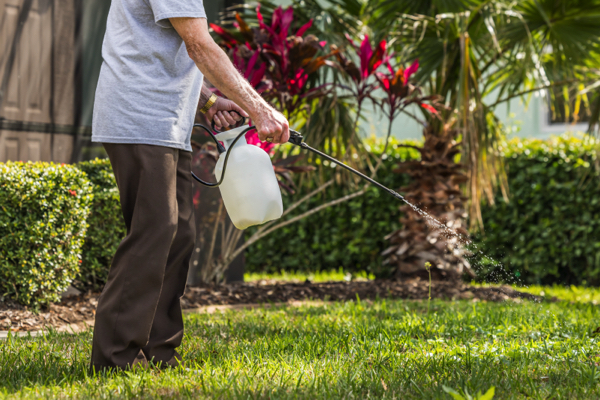 Parler
Parler Gab
Gab
- Diquat, a herbicide banned in over 70 countries, is still used in the U.S. on crops like cotton and potatoes. Marketed as a "safer" alternative to paraquat, it poses similar severe health risks.
- Diquat generates reactive oxygen species (ROS) that degrade the gut lining – causing leaky gut, killing beneficial bacteria and triggering chronic inflammation. This weakens immunity and raises risks for autoimmune diseases and organ damage.
- Beyond the gut, diquat harms the kidneys, the liver and lungs, potentially leading to multi-organ failure. It disrupts tight-junction proteins (e.g., ZO-1, occludin) and promotes harmful bacterial overgrowth.
- Despite evidence of harm, the U.S. permits diquat due to industry influence and outdated policies. Critics compare herbicide regulation to "whack-a-mole," where banned chemicals are replaced by equally dangerous alternatives.
- To mitigate risks, opt for organic produce, use gut-healing nutrients (e.g., resveratrol, probiotics like Lactobacillus plantarum) and advocate for stricter herbicide bans and farmworker protections.
- A leaky gut, where bacteria and toxins leak into the body.
- A weakened immune system, constantly inflamed and misfiring.
- A loss of beneficial gut bacteria, the body's first line of microbial defense.
- Increased risk for chronic illness, including autoimmune diseases and even organ failure.
Why the gut matters
The gut lining, which measures one cell thick, acts as a gateway between the digestive tract and the rest of the body. When it is intact, it absorbs nutrients and filters out threats. But when it is damaged, the immune system goes haywire, attacking both real and 'imagined' dangers. Scientists describe the gut as a "second brain" and the "command center" for immunity. When chemicals like diquat disrupt its function, the ripple effect can extend to:- The kidneys (acute damage and scarring)
- The liver (cell death and energy disruption)
- The lungs (inflammation and oxidative damage)
- And possibly, multiple organ failure in extreme cases.
- Diquat tears down tight junctions: These proteins (with names like ZO-1, occludin and claudin-1) keep the gut sealed. Diquat erodes them, allowing harmful invaders to pass through.
- Diquat kills good bacteria: It reduces helpful strains like Lactobacillus, critical for maintaining the gut lining, producing vitamins and managing inflammation.
- Diquat promoted bad bacteria: It allows inflammatory microbes to take over, increasing the body's stress and reducing its ability to heal.
- Diquat triggers chronic inflammation: This isn't the healing kind of inflammation. It is a low-grade, system-wide fire that can wear down tissues and organs over time.
Why hasn't the U.S. banned diquat?
Here's where it gets frustrating. Diquat has already been banned in over 70 countries, yet it remains legal and widely used in the United States. Critics say it comes down to industry influence, outdated regulatory frameworks and a failure to prioritize cumulative, long-term human exposure. As concern grows around glyphosate and paraquat, companies have pivoted to using diquat instead – without full transparency about its health effects. One toxicologist described the current regulatory pattern as a game of whack-a-mole – ban one substance and another quickly takes its place, often just as harmful. (Related: EWG study: Economic benefits of paraquat herbicide DO NOT outweigh its health risks.) Here's the good news – there are proven strategies to protect and rebuild a gut damaged by diquat:- Choose organically-grown produce when possible. This applies to crops known to be heavily treated with diquat, like cottonseed oil, potatoes and soybeans.
- Support gut repair and health: Nutrients like resveratrol, stevioside and taurine have been shown to protect tight junctions, fight oxidative stress and promote healing.
- Use targeted probiotics: Specific lactic acid bacterial strains, like Lactobacillus plantarum and Pediococcus pentosaceus, can help restore balance in the gut microbiome, reduce inflammation and repair the gut lining.
- Demand better policies: Reach out to representatives; ask for a ban on herbicides like diquat, increased funding for gut health research and stronger protections for farm workers and nearly communities.
More related stories:
Pesticide "Diquat" approved only in USA INJURES LIVER and KIDNEYS while destroying good gut bacteria – study reveals shocking harm to humans. Beverage company that promotes "environmental sustainability" found to be among California's top sprayers of PARAQUAT in 2021. California regulators sound alarm: Herbicide paraquat linked to birth defects, thyroid disease and wildlife risks. Sources include: USRTK.org FrontiersIn.org NaturalHealth365.com Brighteon.comIsraeli tanks massacre 59 starving Palestinians seeking food aid in Gaza, medics report
By Cassie B. // Share
These over-the-counter drugs are linked to rising bowel cancer cases in young adults
By Lance D Johnson // Share
Tucker Carlson blasts Trump as COMPLICIT in Israel-Iran escalation
By Kevin Hughes // Share
Major airlines secretly sold passenger data to federal agencies, documents reveal
By Ramon Tomey // Share
STOP CSAM Act sparks backlash over threats to privacy and free speech
By Laura Harris // Share
Israel depleting its missile defenses amid Iran barrage
By Laura Harris // Share
Governments continue to obscure COVID-19 vaccine data amid rising concerns over excess deaths
By patricklewis // Share
Tech giant Microsoft backs EXTINCTION with its support of carbon capture programs
By ramontomeydw // Share
Germany to resume arms exports to Israel despite repeated ceasefire violations
By isabelle // Share










